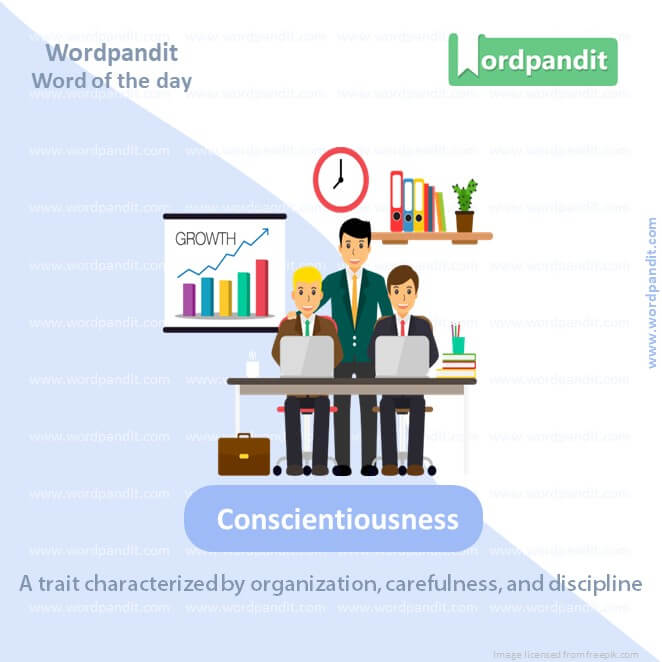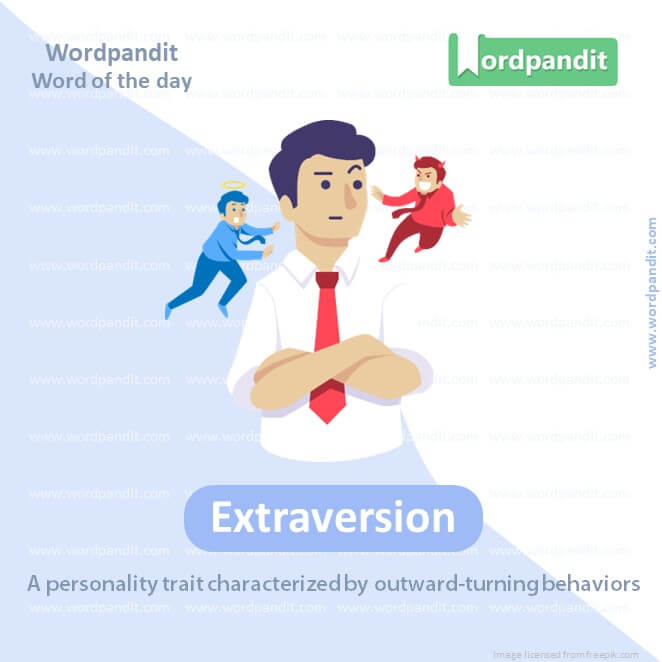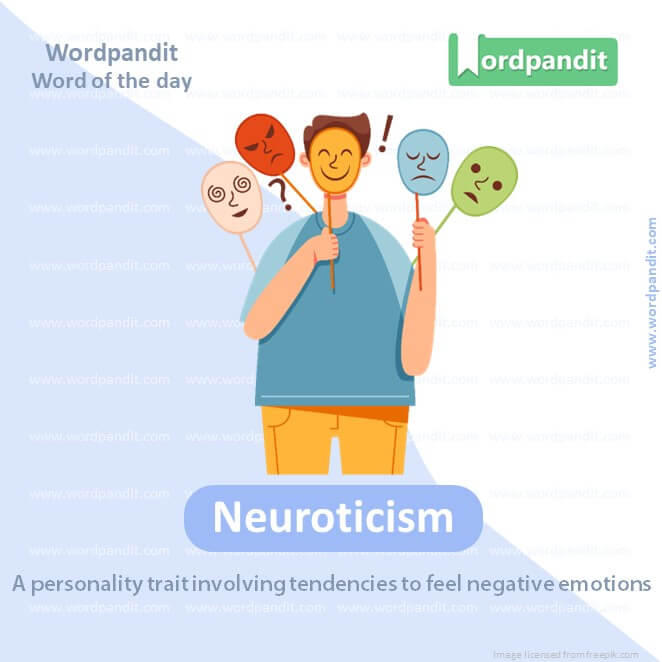Daily Vocabulary Words: List of Daily Used Words
Hi there. Welcome to this special section @ Wordpandit.
Our endeavour here is straightforward: highlighting important daily vocabulary words, you would encounter in The Hindu. This is your repository of commonly used words; essentially, we are posting a list of daily used words. Hence, this has significant practical application as it teaches you words that are commonly used in a leading publication such as The Hindu.
Visit the website daily to learn words from The Hindu.

WORD-1: Conscientiousness
CONTEXT: The article in ‘The Hindu’ discussed how ‘Conscientiousness’, a key trait of the Big Five personality model, has a significant role to play in the success of an individual in personal and professional life.
SOURCE: The Hindu, October 3, 2023, “The Role of Conscientiousness in Success”
EXPLANATORY PARAGRAPH: Imagine if you had a toy and you always took very good care of it, cleaning it, putting it in the right place, and making sure it’s not broken. That’s because you’re being conscientious. It means you are careful and responsible about what you do.
MEANING: A trait characterized by organization, carefulness, and discipline (noun).
PRONUNCIATION: con-she-EN-shus-ness
SYNONYMS: Diligence, Meticulousness, Thoroughness, Responsibility, Carefulness, Precision, Rigor
USAGE EXAMPLES:
1. Her conscientiousness at work earned her a promotion.
2. Due to his conscientiousness, he always handed in assignments on time.
3. Teachers appreciate students who show a high level of conscientiousness.
4. With her conscientiousness, she made sure every detail was perfect.

WORD-2: Correlation
CONTEXT: The Hindu published a study highlighting the ‘Correlation’ between outdoor activities and mental well-being in children.
SOURCE: The Hindu, May 4, 2023, “Outdoor activity linked to kids’ mental health”
EXPLANATORY PARAGRAPH: Imagine you see that whenever it’s sunny, people eat more ice cream. This link between sunshine and eating ice cream is called a correlation. It means two things are connected in some way.
MEANING: A mutual relationship between two or more things (noun).
PRONUNCIATION: core-reh-LAY-shun
SYNONYMS: Connection, Association, Link, Relationship, Affinity, Ties, Bond
USAGE EXAMPLES:
1. There is a correlation between exercise and good health.
2. The study found a strong correlation between sugar consumption and cavities.
3. They noticed a correlation between the weather and people’s moods.
4. The correlation between hard work and success is evident.

WORD-3: Enriching
CONTEXT: In an op-ed, the author talked about ‘Enriching’ experiences such as travel and reading that broaden one’s perspective and understanding of diverse cultures.
SOURCE: The Hindu, January 20, 2023, “Traveling: A Key to Enriching One’s Life”
EXPLANATORY PARAGRAPH: Imagine putting vitamins in your food to make it healthier for you. That’s like enriching it. When something is enriching, it makes things better or more valuable.
MEANING: Improving or enhancing the quality or value of something (verb/adjective).
PRONUNCIATION: en-RICH-ing
SYNONYMS: Enhancing, Improving, Elevating, Augmenting, Uplifting, Edifying, Embellishing
USAGE EXAMPLES:
1. Reading is an enriching experience.
2. Traveling can be an enriching activity.
3. She found the workshop to be very enriching.
4. The soil was enriching with minerals for better crops.

WORD-4: Extraversion
CONTEXT: According to an article in ‘The Hindu’, ‘Extraversion’, another trait from the Big Five personality model, may make some individuals more resilient in the face of traumatic events.
SOURCE: The Hindu, July 2, 2023, “Extraversion can Foster Resilience”
EXPLANATORY PARAGRAPH: Some people love to talk, play, and make new friends; they’re always happy being around others. That’s because they have extraversion. It means they get energy from being with people.
MEANING: A personality trait characterized by outward-turning behaviors (noun).
PRONUNCIATION: ex-truh-VER-shun
SYNONYMS: Outgoingness, Sociability, Assertiveness, Friendliness, Talkativeness, Activeness, Gregariousness
USAGE EXAMPLES:
1. Her extraversion made her popular in school.
2. He often displayed his extraversion by initiating conversations.
3. People with high extraversion often thrive in social settings.
4. Extraversion is one of the five personality traits in psychology.

WORD-5: Neuroticism
CONTEXT: Today’s editorial in ‘The Hindu’ discussed how the trait of ‘Neuroticism’ is often misunderstood and unduly stigmatized in the society.
SOURCE: The Hindu, October 6, 2023, “Understanding Neuroticism”
EXPLANATORY PARAGRAPH: Have you ever seen someone get upset or worried easily, even over small things? That might be because they have something called neuroticism. It means they feel emotions like sadness, worry, or fear more than others.
MEANING: A personality trait involving tendencies to feel negative emotions (noun).
PRONUNCIATION: neuro-TI-sizm
SYNONYMS: Anxiousness, Sensitivity, Insecurity, Moodiness, Emotional instability, Tenseness, Irritability
USAGE EXAMPLES:
1. High neuroticism can lead to feelings of anxiety.
2. People with high neuroticism often overthink situations.
3. Neuroticism is another key personality trait studied by psychologists.
4. She is trying to manage her neuroticism through meditation.
WORD-6: Autocracies
CONTEXT: An opinion piece in ‘The Hindu’ analyzed the rise of ‘Autocracies’ in various parts of the world, using historical precedents to highlight the dangers.
SOURCE: The Hindu, April 14, 2023, “The Rising Trend of Autocracies”
EXPLANATORY PARAGRAPH: An autocracy is like a kingdom where only one person, maybe a king or a queen, decides everything and people don’t get to have a say. This person has all the power.
MEANING: A system where one person has complete power and control (noun).
PRONUNCIATION: auto-CRA-sees
SYNONYMS: Dictatorships, Tyrannies, Despotisms, Totalitarianisms, Absolutisms, Authoritarianisms, Monarchies
USAGE EXAMPLES:
1. Many autocracies have strict rules and regulations.
2. The people rose against the autocracies demanding their rights.
3. In autocracies, freedom of speech is often limited.
4. Historically, many autocracies faced rebellions from their citizens.
WORD-7: Commensurate
CONTEXT: The Hindu business section discussed economic reforms and stressed that policy changes should be ‘Commensurate’ with the magnitude of current economic challenges.
SOURCE: The Hindu, September 1, 2023, “Economic Reforms: A Need for Commensurate Actions”
EXPLANATORY PARAGRAPH: Imagine you did a big job and you got a big reward, and then a small job and got a small reward. That means your reward matches the size of your job. Commensurate is a fancy word that means “matching in size or amount”.
MEANING: Matching in size, degree, or amount; proportionate (adjective).
PRONUNCIATION: kuh-MEN-suh-rate
SYNONYMS: Proportional, Equivalent, Corresponding, Comparable, Matching, Equal, Appropriate
USAGE EXAMPLES:
1. His skills were commensurate with the task at hand.
2. She received a salary commensurate to her experience.
3. The punishment should be commensurate with the crime.
4. The risk and rewards were commensurate in the venture.
WORD-8: Shrouded
CONTEXT: An article in ‘The Hindu’ spoke about a ‘Shrouded’ scandal that has recently come to light, causing upheaval in the political landscape of the country.
SOURCE: The Hindu, June 22, 2023, “Scandal Unearthed: Clarity Amid Shrouded Secrets”
EXPLANATORY PARAGRAPH: Imagine you have a toy and you cover it with a blanket so no one can see it. That’s like “shrouding” the toy. Shrouded means something is hidden or covered up.
MEANING: Covered, concealed, or hidden from view (verb/adjective).
PRONUNCIATION: shrow-ded
SYNONYMS: Veiled, Cloaked, Obscured, Enveloped, Mantled, Blanketed, Covered
USAGE EXAMPLES:
1. The mountain was shrouded in mist.
2. The truth was shrouded in mystery.
3. The ancient city was shrouded in legends.
4. The forest was shrouded in darkness at night.
WORD-9: Befall
CONTEXT: ‘The Hindu’ published an article detailing the multiple crises that may ‘Befall’ a nation unprepared for the effects of climate change.
SOURCE: The Hindu, August 15, 2023, “Climate Change Crisis: Threats that May Befall”
EXPLANATORY PARAGRAPH: When something happens, especially if it’s unexpected or not so good, we can say it “befell”. Like if you’re walking and suddenly trip on a toy, you can say “A trip befell me because of the toy”.
MEANING: To happen or occur, especially to someone (verb).
PRONUNCIATION: bee-FALL
SYNONYMS: Occur, Happen, Take place, Transpire, Come about, Arise, Ensue
USAGE EXAMPLES:
1. We must be prepared for whatever might befall.
2. A great misfortune befell the village.
3. She had a premonition that something bad would befall her.
4. Many adventures befell the young explorer on his journey.
WORD-10: Wary
CONTEXT: In light of recent cybersecurity breaches, ‘The Hindu’ published an article advising businesses to be ‘Wary’ of potential cyber threats and to invest in robust security measures.
SOURCE: The Hindu, February 10, 2023, “Businesses Must Be Wary: Cybersecurity on Spotlight”
EXPLANATORY PARAGRAPH: Imagine you see a cat you’ve never met before, and you’re not sure if it’s friendly. You might approach it slowly and carefully. That means you’re being “wary”. It’s like being careful because you’re not sure about something.
MEANING: Feeling cautious about potential dangers or problems (adjective).
PRONUNCIATION: WAIR-ee
SYNONYMS: Cautious, Careful, Guarded, Vigilant, Watchful, Suspicious, Alert
USAGE EXAMPLES:
1. She was wary of strangers.
2. Always be wary when giving out personal information online.
3. The dog was wary of the new guest.
4. After his previous mistake, he became wary of making decisions hastily.
Vocabulary Importance
In the realm of language learning, understanding ‘vocabulary importance’ is a fundamental concept. Words are the building blocks of language and a rich vocabulary fuels effective and persuasive communication. However, embracing ‘vocabulary importance’ involves more than just acknowledging its role – it requires you to integrate it into your learning strategy.
To truly grasp ‘vocabulary importance’, expose yourself to a variety of reading and listening activities. Whether it’s reading novels, engaging with podcasts, or watching films in your the profound impact of having a robust vocabulary arsenal and will illuminate the practical ‘vocabulary importance.’
Additionally, recognizing ‘vocabulary importance’ necessitates an active approach to vocabulary acquisition. Regularly dedicate time to learning new words. Use flashcards, word lists, language apps, or even set a ‘word of the day’ to maintain a steady flow of vocabulary learning.
Incorporating the learnt vocabulary into your speech and writing is non-negotiable when understanding ‘vocabulary importance’. Regular usage not only enhances vocabulary retention, but it also uncovers the magic of eloquent expression that a blossoming vocabulary can yield.
It’s also beneficial to lean on memory aids in recognizing ‘vocabulary importance’. Associating words with images, stories or personal anecdotes creates strong memory hooks, enhancing vocabulary recall and solidifying the understanding of ‘vocabulary importance’.
To sum it up, ‘vocabulary importance’ is not just a theory to be noted, but a mantra to be embraced in your language learning journey. Engage with a wide variety of resources, actively learn and use new words, and utilize effective recall techniques. As you uncover the depths of ‘vocabulary importance’, you’ll realize that every new word is a fresh shade on your language palette, painting your communication canvas with hues of eloquence, clarity, and confidence.













